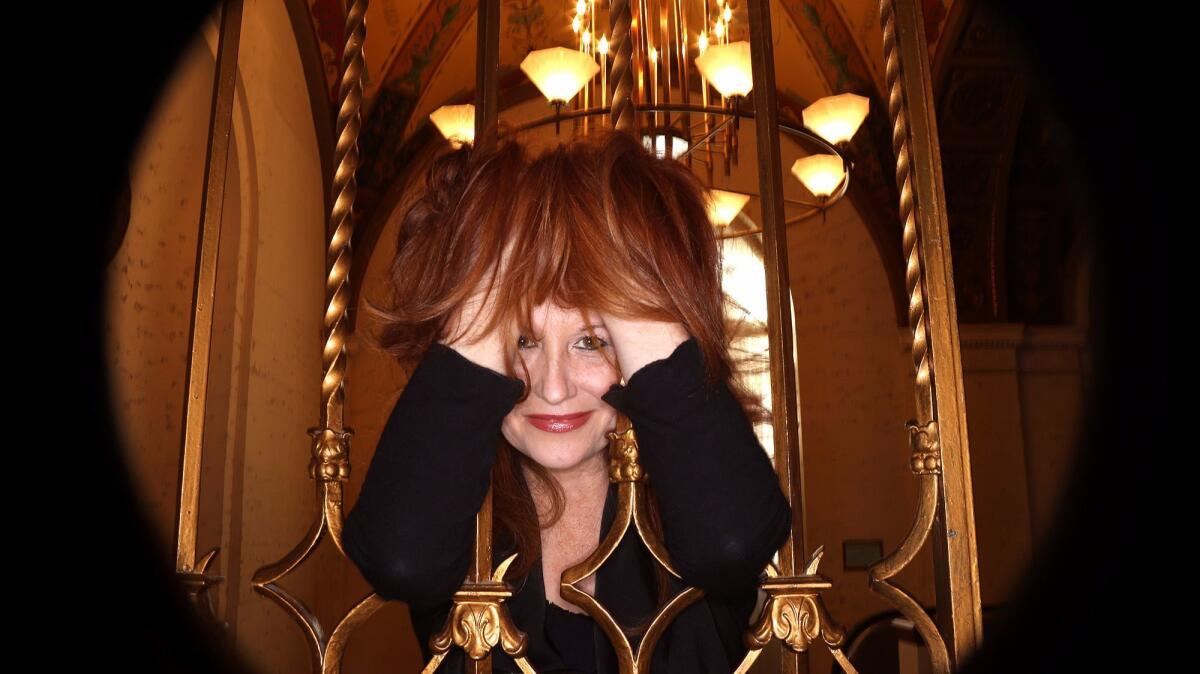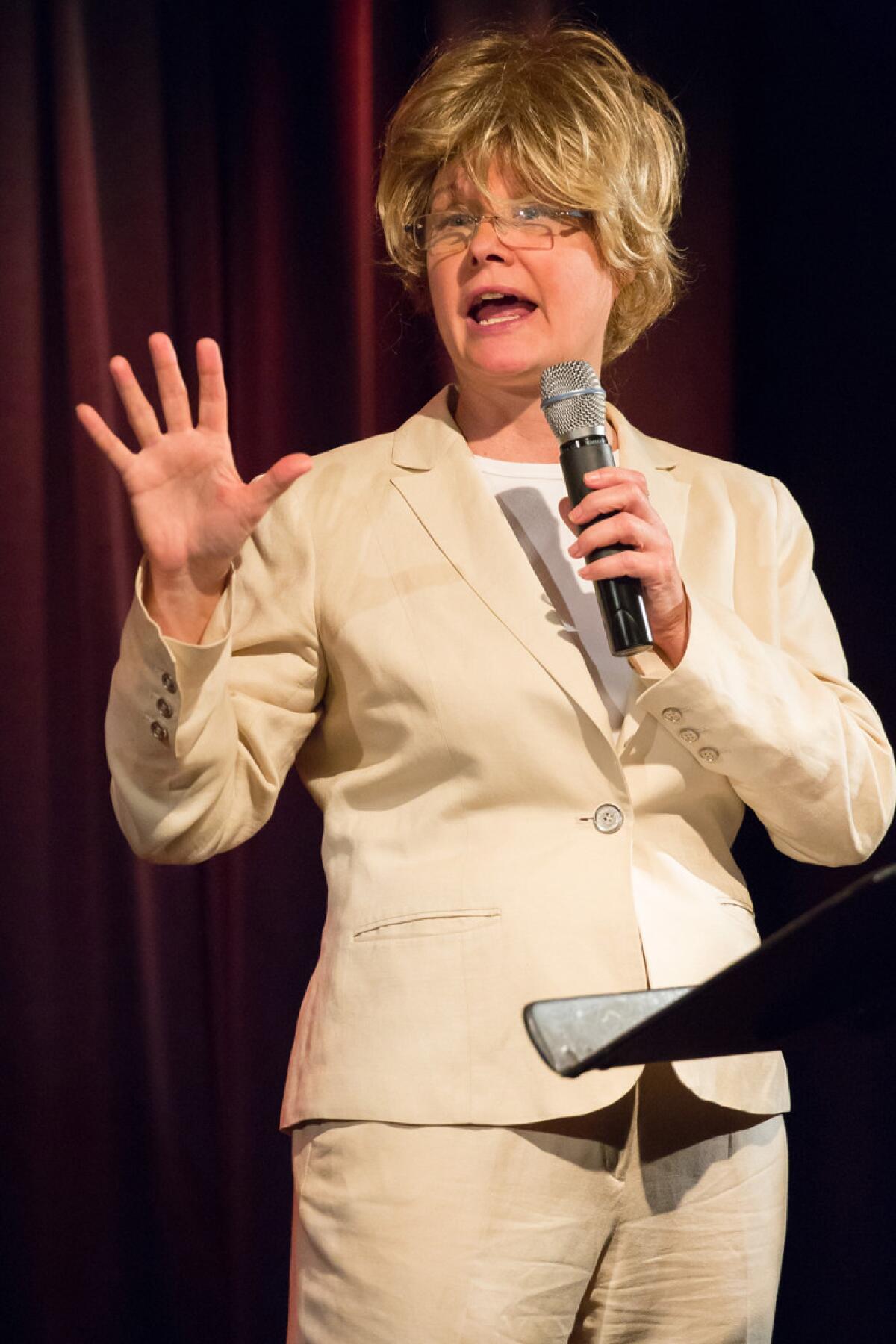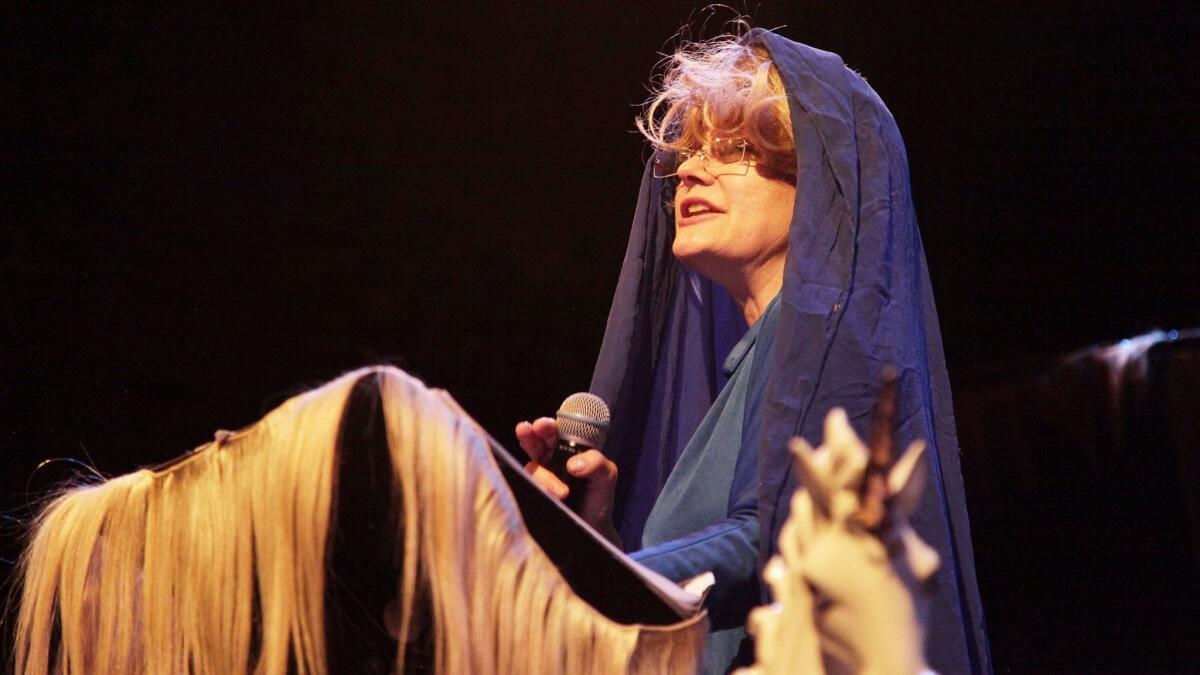Q&A: This is what happens when performance artist Karen Finley inhabits Trump and talks Weinstein
Election 2016 threw a Molotov cocktail into the worldâs electoral politics â in the process throwing culture into a state of near-permanent turmoil.
There is raging debate over the future of Confederate monuments, the treatment of women and the significance of whiteness. New York performance artist Karen Finley dives right into the maelstrom in her new performance, âThe Expanded Unicorn Gratitude Mystery,â which runs through Sunday at REDCAT in downtown Los Angeles.
Needless to say, there will be wigs, a red baseball cap and a pantsuit. There will also be be Finleyâs unsparing psychological deconstruction of the subjects at hand: race and gender â as told through the personas of
âItâs about whiteness and dominance â white power,â Finley says via telephone. âIâm looking at this within these spaces. Weâre in these white spaces, so how are we involved with this? I am speaking to my own whiteness.
âWe have to be questioning ourselves. How are we going to be speaking up?â

Certainly, Finley has a reputation for speaking up. The artist is by now well known for visceral acts that take on difficult topics such as abuse, sexism, trauma and victimization.
In one early performance, she covered her naked body in chocolate, and she became became internationally famous for her provocative acts with yams, works that drew the ire of conservative congressman Jesse Helms and resulted in Finley having a grant withdrawn by the National Endowment for the Arts. (It would later become a court case that would travel all the way to the U.S. Supreme Court.)
In âExpanded Unicorn,â Finley says sheâs looking to garner a few laughs. âI do use humor in this work as a way for us to get our minds around the complexity of the spaces we donât even want to look at.â
In this lightly edited interview, Finley chats about the psychologies of Trump and Clinton, the sex assault scandal surrounding Miramax co-founder Harvey Weinstein, and why she turns to cookbooks when she needs to chill out.
What sparked âExpanded Unicornâ? What made you want to take on the topic of the presidential election ?
I was working at first, writing about the symbolism of the unicorn, of the imaginary creature, this white creature. And I was writing about the idea of the apologetic woman, who is always grateful, always expressing gratitude. And I was looking at the opposite of that â of male power or dominance â and then I began looking at the dynamics of our election process. Thatâs what started it.
How is it that women are expected to be grateful?
For Hillary, or for any woman who is in a position that has some type of value, she has to stay in a space of gratitude. She had to always be asking for forgiveness â with her body onstage, with the situation of taking too much time to pee. Every gesture is that she has to ask forgiveness for occupying a female form. And her female form is considered dangerous: the ability to be hysterical, to menstruate, to be sexually enticing.

In your performances, you have taken on the guises of many famous women, including Jacqueline Onassis â whom you channeled in a production at the Broad museum two years ago. What was intriguing to you about Clinton?
In doing my research for this, it was looking at the relationship between Hillary and Trump. He takes up where Bill left off. She is used to being in these relationships where she is humiliated. And there is a deeper aspect to that situation. I have a moment in [âUnicornâ] where you have the climax of the blue dress, the Monica Lewinsky situation â everything that you wanted her to speak about, I speak about. Imagine what it would have been like for her to go back to the Oval Office where Monica and Bill had their encounter, the place where she was humiliated â taking that space and the power of that seat.
Whatâs your psychological profile on Trump?
That he is the desire for the blonde. The preoccupation with his hair, the blondness of the hair, the fetish of that. It certainly looks like a bouffant to me. He wants to be the blonde â that image that is desired and loved.
And the âpussyâ grabbing and the violations, itâs not really about sexuality. Itâs about violence. Itâs about fear. Itâs about dominance. There is no love. There is no tenderness. There isnât a sexiness about it â itâs all about violence.

Your work has long explored the ways in which women are treated and abused. This performance is landing amid the explosive allegations of sexual assault at Miramax. What kind of context does this give your show?
Weâve all been there. [In the case of Weinstein], these are actresses. But it happens when youâre a waitress. It happens when youâre a clerk. It happens when youâre in the grocery store. It happens when youâre in an elevator. A womanâs life is never knowing when your body is going to become someone elseâs â that your body is owned.
The standard that there is for female presentation is that you have to be desired. But, then once you are desired, you are denigrated for that simultaneously. These actresses are put in a position of desire, but then they are denigrated. Thatâs the culture we live in.
There was a spell of more than a dozen years when you didnât do any performances in Los Angeles. Whatâs brought you back to the city in a more regular way in the last five years?
I think some of it was that after the NEA situation [starting in 1990] I didnât have access to certain funding or to certain support and I started performing more in New York, and I went to Europe. But also, after the NEA, I came to Los Angeles and I lived here for a while to regain my strength and my acceptance. I did other work.
But Iâm glad that Iâm back. I just wrote in my notes, thanking all of the arts organizations and people that have supported me here in Los Angeles. Iâm a performer and I take to the stage and I like entertainment and I like show business. So when Iâm here, I feel that Iâm part of that. I donât need to explain my value or my worth.
Speaking of entertainment, what does Karen Finley do for entertainment?
Iâve been rewatching âThe Sopranos.â Iâve been studying [James Gandolfiniâs] performances. Thatâs what Iâve been looking at. I think it was his maleness he was having trouble with â the great weight of proving his male body, the burden of it.
To relax, I read cookbooks. Iâm a foodie. I like to cook. I can imagine the food. And I find it really relaxing thinking about it. I find that idea of the potential of human beings being at a table together, of there being a place where there can be some connections. It gives me a sense of peace.
Karen Finley: âThe Expanded Unicorn Gratitude Mysteryâ
Where: REDCAT, 631 W. Second St., downtown Los Angeles
When: Runs through Sunday
Admission: $16-25
Info: redcat.org
The biggest entertainment stories
Get our big stories about Hollywood, film, television, music, arts, culture and more right in your inbox as soon as they publish.
You may occasionally receive promotional content from the Los Angeles Times.








